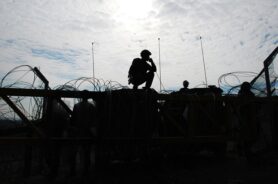IRW is proud to share the report ‘After the Strike’, created in conjunction with PAX and Al-Ghad League for Women and Children.
The report focuses on the reverberating effects of the Dutch bombardment of Hawija, Iraq. When two Dutch F16s targeted an ISIS munition factory in the city in 2015, the airstrike and the resulting secondary explosion killed 85 civilians, left hundreds injured, and destroyed the homes of thousands.
Needless to say, the event continues to profoundly impact the lives of the surviving civilians many years after the event. However, while the Dutch government admitted being responsible for the casualties in 2019, little was done to understand the true consequences or proportionally compensate the victims. Establishing facts about the damage done was considered to be too difficult.
The team of researchers from PAX, Intimacies of Remote Warfare, and Iraqi NGO Al-Ghad refused to believe this. During the past two years, they visited the area multiple times and spoke to 119 victims in an effort to create a more complete picture. By doing so, they are now the first to clearly define the direct and indirect effects of the event.
Their findings not only highlight the devasting and compounding impact of remote bombing in rebel-held urban centers but also shows how people give meaning to the harm that was done to them. Civilians in Hawija resent the Dutch government for ignoring the civilian harm they caused and demand an apology and individual compensation. IRW’s dr. Lauren Gould (project lead) and prof. dr. Jolle Demmers conclude that if these demands are not met this could sow the seeds for the next cycle of violence.
Read the report here:
On April 13th, the team will gather in Amsterdam to present and discuss their findings during a live event at De Balie. Interested in joining? Find more information and tickets here.



